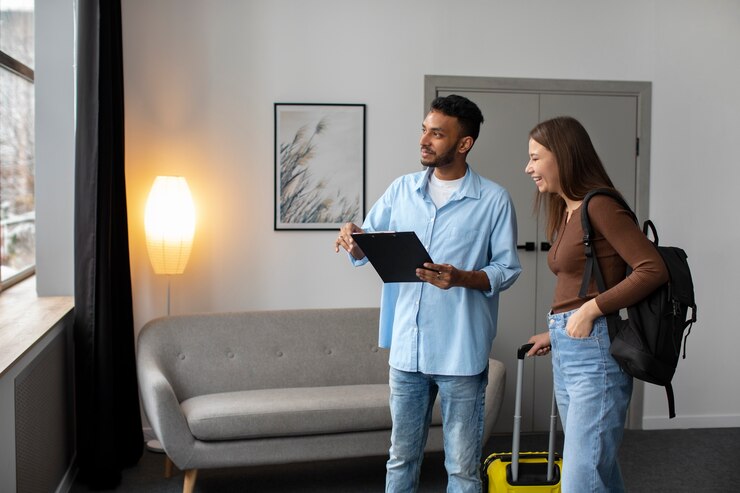Starting an Airbnb business in the UK can be an exciting and profitable venture. With the right planning and preparation, you can turn your property into a successful rental space that provides travelers with a comfortable and enjoyable stay. In this article, we will guide you through the process of starting an Airbnb business in the UK. We will cover market assessment, legal and tax considerations, and other essential aspects to ensure a smooth start and ongoing success.
Start An Airbnb Business In The UK In 8 Steps
Here is the simple and easy guide to start your own Airbnb business in the UK:

1. Do Market Assessment
Before starting your Airbnb business, it’s crucial to assess the market demand and competition in your area. Research the local rental market, including the pricing, occupancy rates, and types of properties available.
Consider factors such as seasonality, tourist attractions, and local events that may influence demand. By understanding the market dynamics, you can set appropriate prices and offer unique experiences to stand out from the competition.
2. Legal & Tax Considerations
When starting an Airbnb business in the UK, it’s essential to understand and comply with local laws and regulations. Familiarize yourself with the UK’s short-term rental regulations and ensure that your property meets the requirements. Obtain any necessary licenses or permits, such as planning permission or a change of use consent if you’re converting a property into a short-term rental.
Another aspect to consider is the type of contract you will use for your guests. If they opt for a short-term stay, the Airbnb platform should suffice. However, if guests request a longer stay, you should consider using a legally compliant e-signature lease agreement platform to ensure the rights of all parties are protected for the duration of the booking.
In terms of taxes, you will need to declare your rental income and pay taxes on your earnings. Consult a tax professional to determine if you need to register for VAT, and make sure you understand the rules around allowable expenses and tax reliefs.
3. Decide Your Hosting Style
Before you start your Airbnb business, it’s important to decide what kind of host you want to be. There are two main types of Airbnb hosts: those who rent out their entire property and those who rent out individual rooms within their home.
Both options have their pros and cons, so consider which best suits your lifestyle and preferences. You’ll also want to think about how much time and effort you’re willing to put into managing your Airbnb business, as this will influence your hosting style.
4. Prepare Your Property
Once you’ve decided on your hosting style, it’s time to prepare your property for guests. First, ensure that your property meets all local safety and legal requirements. This may include installing smoke detectors, obtaining necessary permits, and ensuring compliance with zoning regulations.
Next, consider any necessary renovations or upgrades to make your property more appealing to guests. This might include painting walls, updating furniture, or adding new amenities like Wi-Fi or a smart TV.
5. Create A Compelling Listing On Airbnb
Now that your property is ready, it’s time to create your Airbnb listing. Make sure to take high-quality photos of your property, showcasing its best features and any unique selling points. Write a detailed description, highlighting the property’s amenities, location, and any nearby attractions.

Remember to set competitive prices for your property and consider offering discounts for longer stays or special promotions to attract more guests.
6. Consider Guest Experience
Providing a great guest experience is crucial for the success of your Airbnb business. Think about the small touches that can make a big difference in your guests’ stays, such as providing a welcome package with snacks and local information or offering a guidebook with recommendations for nearby attractions and restaurants.
Respond to guest inquiries quickly and professionally, and be available to assist with any issues that may arise during their stay. By going above and beyond to ensure your guests have a memorable experience, you’ll increase the likelihood of positive reviews and repeat bookings.
7. Manage Bookings
Running an Airbnb business means you’ll be managing multiple bookings. Initial steps include setting up your listing on Airbnb’s app or website, where you’ll provide an in-depth description of your property and upload high-quality photos.
Next, you’ll set your availability and pricing. It is a good idea to consider factors such as peak seasons, weekends, and school holidays when deciding your rates. Utilizing hosting tools like property management software can simplify this task by helping you track bookings, manage schedules, and even automate responses to common guest inquiries.
8. Financial Management
Understanding the financial aspect is a key component in running a successful Airbnb business. One of the benefits of hosting in the UK is the ‘rent-a-room-relief’ scheme, which allows you to earn up to £7,500 per year tax-free. Be sure to understand these regulations to maximize your earnings.
You should also familiarize yourself with the local laws and regulations where your property is located. Areas like Northern Ireland require specific licensing for short-term rentals. Also, if you’re renting a property, ensure you have permission from your landlord or if you’re a homeowner, make sure your mortgage provider allows subletting.
In addition to tax management, consider getting insurance policies beyond Airbnb’s ‘Aircover’. This will give you full protection and peace of mind in case any unexpected incidents occur.
Conclusion
Starting an Airbnb business in the UK can be exciting if you plan well. First, research the local market and understand the rules you need to follow. Decide if you’ll rent out a room or your whole property. Make sure your place meets safety standards and looks appealing to guests. Create an attractive Airbnb listing with good photos and clear descriptions. Provide a great experience for guests by being responsive and helpful. Manage your bookings and finances carefully, considering tax rules and insurance needs. By focusing on these steps, you can start and run a successful Airbnb business in the UK smoothly.
Also Read:















